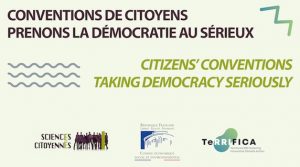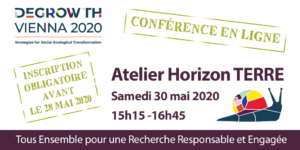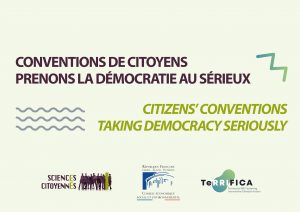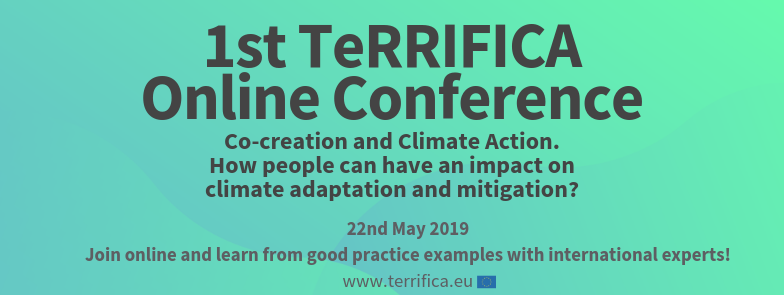- Better understand climate manipulation on a large scale juin 21st, 2022Continue reading…
As part of the citizen mobilizations of COP21 (United Nations Climate Change Conference) in 2015. Sciences Citoyennes decided to seize the matter of geo- engineering. Since then, we have participated to spreading acculturation on those controversial subjects.
SC chose to multiply formats and diffusion canals in order to make this information more accessible to everyone.
- Citizens’ Conventions, Taking Democracy Seriously juillet 2nd, 2020Continue reading…
The videos of the conference in English are online!
 The 3rd TeRRIFICA Reflective Workshop and Conference “Citizens’ Conventions, Taking Democracy Seriously” was held in Paris on October 14th and 15th 2019. The event was hosted at the Economic Social and Environmental Council (CESE) and the Fondation Charles Léopold Mayer.
The 3rd TeRRIFICA Reflective Workshop and Conference “Citizens’ Conventions, Taking Democracy Seriously” was held in Paris on October 14th and 15th 2019. The event was hosted at the Economic Social and Environmental Council (CESE) and the Fondation Charles Léopold Mayer.Sciences Citoyennes organized both activities within the framework of the H2020 TeRRIFICA project, whereby eight European institutions work together to foster competence for climate change adaptation and mitigation in different European regions with a specific focus on Responsible Research and Innovation.
- Lettre ouverte des organisations sur le mécanisme de règlement des différends entre investisseurs et États (RDIE) et le COVID -19 juin 26th, 2020Continue reading…
630 organisations de la société civile, dont Sciences Citoyennes, ont signé cette lettre ouverte alarmant les gouvernements sur une vague de plaintes COVID-19 dans des « tribunaux d’entreprise ». La lettre a été envoyée au Premier Ministre français Edouard Philippe. Retrouvez également le communiqué de presse expliquant l’initiative.
À l’endroit des gouvernements:
Aujourd’hui, nous vous invitons, par la présente lettre, à prendre l’initiative pour assurer que les pays du monde ne soient confrontés à une vague de poursuites de règlements des différends entre investisseurs et États (RDIE) en raison des mesures prises pour lutter contre la pandémie COVID-19 et la crise économique qui en découle.
Partout dans le monde, certains gouvernements prennent des mesures pour sauver des vies, endiguer la pandémie, protéger les emplois,lutter contre les catastrophes économiques et veiller à ce que les besoins fondamentaux des populations soient couverts. L’ampleur de ces mesures est sans précédent dans les temps modernes et la nécessité de ces actions est évidente. Cependant, la portée très étendue du mécanisme de RDIE pourrait exposer ces mesures gouvernementales cruciales à des plaintes avec demande d’indemnisation à hauteur de plusieurs millions de dollars de la part des investisseurs étrangers. Le nombre de ces plaintes pourrait également être sans précédent et imposer des charges financières considérables aux gouvernements qui croulent déjà sous le fardeau des crises sanitaires et économiques dévastatrices.
- Atelier Horizon TERRE en ligne le 30 mai 2020 – Workshop Horizon TERRE online on May 30th, 2020 (FR/EN) mai 26th, 2020Continue reading…
Le projet Horizon Terre, porté par les associations Sciences Citoyennes, Ingénieurs sans Frontières et le collectif Atécopol, depuis septembre 2019, vise à créer des scénarios de recherche alternatifs à ceux d’Horizon Europe (le programme cadre de recherche de l’Union Européenne) dans l’objectif de créer des synergies entre les collectifs de chercheurs et d’étudiants et in fine, de faire du plaidoyer au niveau européen et national pour contribuer à faire infléchir les politiques d’orientation de la recherche selon les axes définis par les membres du projet.

Les membres du projet vont animer un premier un évènement public de consultation sous la forme d’un atelier durant la Vienna Degrowth Conference. Cet atelier en anglais aura lieu en ligne le samedi 30 mai de 15h15 à 16h45. Animé par des chercheurs (sciences sociales et sciences expérimentales) et des experts associatifs, il s’adresse à une trentaine de participants.
- Réponse au rapport parlementaire sur les perturbateurs endocriniens dans les plastiques janvier 22nd, 2020Continue reading…
Une réponse écrite par Jérôme Santolini, chercheur en Biologie, administrateur de Sciences Citoyennes, membre de « Cantine Sans Plastique France » et coauteur du livre « Pas de plastique dans nos assiettes – des perturbateurs endocriniens à la cantine »
Il y a quelques jours, les député.es Claire Pitollat et Laurianne Rossi présentaient en grande pompe le rapport de leur mission d’information parlementaire sur les perturbateurs endocriniens présents dans les contenants en plastique. En écho aux annonces officielles et médiatiques (vidéos, articles…), le rapport souligne avec emphase l’urgence de la situation, l’ampleur de la crise sanitaire.
- Conventions de Citoyens, prenons la démocratie au sérieux – Les vidéos de la conférence sont en ligne ! novembre 6th, 2019Continue reading…
La conférence Conventions de Citoyens, prenons la démocratie au sérieux s’est tenue le 14 octobre 2019 au Conseil économique social et environnemental (CESE), dans le cadre du projet européen sur la co-création d’action contre le changement climatique, TeRRIFICA – Territorial Responsible Research and Innovation Fostering Innovative Climate Action.
 Les Assemblées citoyennes en Irlande, l’annonce par Emmanuel Macron d’une Convention citoyenne pour la transition écologique, les revendications d’organisations environnementales pour une Assemblée citoyenne face à l’urgence climatique et écologique, les promesses de démocratie par le digital… Les revendications pour que l’avis des citoyens soit au cœur des décisions politiques sont nombreuses. Mais quelle procédure de démocratie participative mettre en place ? Selon quelles conditions une telle procédure peut-elle être réellement démocratique et prendre en compte l’avis éclairé des citoyens ?
Les Assemblées citoyennes en Irlande, l’annonce par Emmanuel Macron d’une Convention citoyenne pour la transition écologique, les revendications d’organisations environnementales pour une Assemblée citoyenne face à l’urgence climatique et écologique, les promesses de démocratie par le digital… Les revendications pour que l’avis des citoyens soit au cœur des décisions politiques sont nombreuses. Mais quelle procédure de démocratie participative mettre en place ? Selon quelles conditions une telle procédure peut-elle être réellement démocratique et prendre en compte l’avis éclairé des citoyens ? - State of play EU Defence Fund: EP plenary vote on Wednesday 12 décembre 11th, 2018Continue reading…
Sciences Citoyennes est co-signataire de cette lettre ouverte aux parlementaires européens
Dear Member of the European Parliament,
on Wednesday 12 December, you will make a decisive vote on the proposal for a European Defence Fund to dedicate €13 billion for research and development projects in military technologies during the next multi-financial framework.
44 non-profit organisations across Europe have recently alerted about the risks the current proposal entails, regarding the diversion of funds from civilian priorities and the over-influence of the arms industry, as well as the possible contribution to the development of killer-robots and the future exports of EU-funded goods.
- Citizen Conventions are needed to define European research. janvier 12th, 2018Continue reading…
Europe’s next budget for research-funding could reach €120-billion for the coming seven years. The European Parliament will vote in 2019 on its allocation in the next Research Framework Programme (FP9). Once again, most of that money will be granted to multinational companies, unless…
Sciences Citoyennes and Global Health Advocates, supported by a coalition of European non-governmental organisations (NGOs), have succeeded in convincing of the need for revitalisation of European democracy. The goal can only be achieved through the political engagement of citizens.
- Scientists and Civil Society Must Move Together toward a New Science mai 18th, 2016Continue reading…
Article proposed and written by an advisory board member of Sciences Citoyennes, Christian Vélot1,2,3,4* , about democracy in science and public engagement, illustrated by a concrete example of participatory research. This is an open-access article, originally published here : http://journal.frontiersin.org/article/10.3389/fpubh.2016.00096/full.
- A Manifesto For a Responsible Scientific Research janvier 25th, 2016Continue reading…
As a result of a collective work, here is our Manifesto for a Responsible Scientific Research. Fondation Sciences Citoyennes purpose is to encourage debates concerning the scientific research aims and the means to implement individual and collective accountability in this field.
- Lettre ouverte des organisations sur le mécanisme de règlement des différends entre investisseurs et États (RDIE) et le COVID -19 juin 26th, 2020Continue reading…
630 organisations de la société civile, dont Sciences Citoyennes, ont signé cette lettre ouverte alarmant les gouvernements sur une vague de plaintes COVID-19 dans des « tribunaux d’entreprise ». La lettre a été envoyée au Premier Ministre français Edouard Philippe. Retrouvez également le communiqué de presse expliquant l’initiative.
À l’endroit des gouvernements:
Aujourd’hui, nous vous invitons, par la présente lettre, à prendre l’initiative pour assurer que les pays du monde ne soient confrontés à une vague de poursuites de règlements des différends entre investisseurs et États (RDIE) en raison des mesures prises pour lutter contre la pandémie COVID-19 et la crise économique qui en découle.
Partout dans le monde, certains gouvernements prennent des mesures pour sauver des vies, endiguer la pandémie, protéger les emplois,lutter contre les catastrophes économiques et veiller à ce que les besoins fondamentaux des populations soient couverts. L’ampleur de ces mesures est sans précédent dans les temps modernes et la nécessité de ces actions est évidente. Cependant, la portée très étendue du mécanisme de RDIE pourrait exposer ces mesures gouvernementales cruciales à des plaintes avec demande d’indemnisation à hauteur de plusieurs millions de dollars de la part des investisseurs étrangers. Le nombre de ces plaintes pourrait également être sans précédent et imposer des charges financières considérables aux gouvernements qui croulent déjà sous le fardeau des crises sanitaires et économiques dévastatrices.
- Mettre fin aux procès-bâillons : protéger la démocratie et les droits fondamentaux juin 8th, 2020Continue reading…
Sciences Citoyennes est associé à la coalition de 119 organisations demandant aux institutions européennes de renforcer la législation contre les procès-bâillons.
Un policy paper, ci-dessous (en anglais) a été publié ce jour :
Ending Gag Lawsuits in Europe Protecting Democracy and Fundamental Rights
The problem: gag lawsuits against public interest defenders
 The EU must end gag lawsuits used to silence individuals and organisations that hold those in positions of power to account. Strategic Lawsuits Against Public Participation (SLAPP) are lawsuits brought forward by powerful actors (e.g. companies, public officials in their private capacity, high profile persons) to harass and silence those speaking out in the public interest. Typical victims are those with a watchdog role, for instance: journalists, activists, informal associations, academics, trade unions, media organisations and civil society organisations.
The EU must end gag lawsuits used to silence individuals and organisations that hold those in positions of power to account. Strategic Lawsuits Against Public Participation (SLAPP) are lawsuits brought forward by powerful actors (e.g. companies, public officials in their private capacity, high profile persons) to harass and silence those speaking out in the public interest. Typical victims are those with a watchdog role, for instance: journalists, activists, informal associations, academics, trade unions, media organisations and civil society organisations. - Scientists and Civil Society Must Move Together toward a New Science mai 18th, 2016Continue reading…
Article proposed and written by an advisory board member of Sciences Citoyennes, Christian Vélot1,2,3,4* , about democracy in science and public engagement, illustrated by a concrete example of participatory research. This is an open-access article, originally published here : http://journal.frontiersin.org/article/10.3389/fpubh.2016.00096/full.
- Conflicts of interest at the European Food Safety Authority : Enough is enough! mars 4th, 2016Continue reading…
Civil society groups ask the European Parliament’s Budget control committee to postpone EFSA’s budget discharge, as long as it fails to enact a serious independence policy on regulated commercial interests. Our demand is also to provide an additional budget for EFSA to pay independent experts and develop in-house research.
- Non à la directive sur le secret des affaires février 18th, 2016Continue reading…
La Fondation Sciences Citoyennes s’associe à la campagne de demande de rejet de la directive sur le secret des affaires.
Une vidéo en anglais sous-titrée en français (sous-titre à activer via le bouton dédié dans la barre de contrôle de la vidéo) explique les enjeux et dangers de cette directive :
N’hésitez pas à diffuser l’information et à retweeter notre appel : https://twitter.com/fsc_infos/status/699559325409243136
- European civil society organisations call for the rejection of the EU Trade Secrets Directive février 4th, 2016Continue reading…
La Fondation Sciences Citoyennes est signataire d’un appel à rejeter la directive sur le Secret des Affaires. En voici le texte en anglais :
On 28 January 2016, the European Parliament’s Legal Affairs Committee will vote to accept or reject the text of the EU Trade Secrets Directive agreed in trilogues at the end of 2015. We call on its members to reject it.
The text is the result of negotiations between the European Commission, EU Member States and the European Parliament, which spent half of 2015 debating and amending it. The negotiators have made clear that further amendment is not welcome. But this text is also a result of the lobbying of multinational corporations from the US and the EU, whose lobbyists helped a few officials at DG Internal Market draft and push for its publication. Of course, right now the companies appearing publicly to defend the text are only European SMEs and innovative start-ups.
- A Manifesto For a Responsible Scientific Research janvier 25th, 2016Continue reading…
As a result of a collective work, here is our Manifesto for a Responsible Scientific Research. Fondation Sciences Citoyennes purpose is to encourage debates concerning the scientific research aims and the means to implement individual and collective accountability in this field.
- Mise en liberté de mouches génétiquement modifiées en Espagne juillet 27th, 2015Continue reading…
Des essais à grande échelle mettent en risque la biodiversité et la production d’olives dans la région méditerranéenne.
La société britannique Oxitec prévoit la libération de mouches de l’olive génétiquement modifiés, en Catalogne (Espagne). Ces insectes sont modifiés de façon à ce que les descendantes femelles meurent (à l’état larvaire, dans les olives), tandis que les générations mâles survivent. L’objectif de la société Oxitex est de libérer jusqu’à 5000 mouches par semaine, dans une région proche de Tarragone, sur une zone expérimentale d’environ 1000m2. Face aux risques de modification de la biodiversité et de dissémination, y compris dans des productions d’agriculture biologique, des organisations, dont la Fondation Sciences Citoyennes, demandent l’interdiction de toute libération de ces espèces.
Une information plus complète est disponible en anglais ci-dessous :
- Global activist summit on nanotech calls on governments to protect people & environment octobre 21st, 2011Continue reading…
Some 30 activists representing 14 environmental, technology assessment and consumer organisations from Europe, the United States, Canada and Latin America met for the 4th International Nanotechnology Activist Summit in Berlin on October 6 and 7 2011.
- The pamphlet on citizen scientists septembre 4th, 2010Continue reading…
This pamphlet is an output of the STACS (Science, Technology and Civil Society) project, funded by the European Commission Sixth Framework Programme (Science and Society-19-044597).
The pamphlet
Preface: Fieldwork
Consider the cauliflower. The cauliflowers we eat now tend to be big, white and fluffy. They have been bred this way over the last 30 years, taking the place of the various Italian varieties that were once bred on farms. Europe has largely forgotten the other possible shapes, colours – green, yellow, pink and purple – and flavours of cauliflowers. In the fields and village markets of Brittany, a group of farmers, activists and scientists are trying to help us remember.
- 2nd TeRRIFICA Reflective Workshop – Réfléchir sur les Indicateurs-Clés de Performance au « Science meets Parliaments » à Belgrade juillet 9th, 2019Continue reading…
 Le deuxième Reflective Workshop TeRRIFICA aura lieu les 10 et 11 juillet à Belgrade. Il se tiendra dans le cadre de l’évènement « Science Meets Parliaments » au sein de l’Assemblée Nationale de la République de Serbie. L’équipe TeRRIFICA se réunira après le workshop pour une réunion de Consortium interne.
Le deuxième Reflective Workshop TeRRIFICA aura lieu les 10 et 11 juillet à Belgrade. Il se tiendra dans le cadre de l’évènement « Science Meets Parliaments » au sein de l’Assemblée Nationale de la République de Serbie. L’équipe TeRRIFICA se réunira après le workshop pour une réunion de Consortium interne.Ce second workshop portera sur les Indicateurs-Clés de Performance en lien avec les actions contre le changement climatique. Les six régions pilotes TeRRIFICA en Allemagne, Biélorussie, Espagne, France, Pologne et Serbie seront présentes autour de thématiques communes: air, agriculture, eau et température.
Ce workshop est organisé par le Center for the Promotion of Science dans le cadre du projet H2020, TeRRIFICA, dans lequel huit organisations européennes travaillent ensemble pour favoriser les actions d’atténuation et d’adaptation au changement climatique dans différentes régions européennes, avec un prisme par la Recherche et l’Innovation Responsable.
2nd July 2019
After a successful 1st TeRRIFICA Reflective Workshop, TeRRIFICA will hold the 2nd TeRRIFICA Reflective Workshop at theNational Assembly of the Republic of Serbia on July 10th and 11th.
- 1st TeRRIFICA Online Conference: “Co-creation and Climate Action. How people can have an impact on climate adaptation and mitigation?” mai 14th, 2019Continue reading…
- La première Conférence en ligne TeRRIFICA se tiendra le 22 mai 2019, de 10h à 14h. L’inscription est gratuite et se fait par email via hannah.hoff[a]uni-vechta.de
- La Conférence commencera par une intervention sur la co-création du Dr. Angela Connelly (University of Manchester). La Conférence mettra également en avant les exemples de bonnes pratiques des six régions pilotes en Biélorussie, France, Allemagne, Pologne, Serbie et Espagne combinant des processus de co-création et des stratégies d’atténuation et d’adaptation au changement climatique.
- La Conférence est organisée par la Boutique des Sciences Vectha/Cloppenburg University of Vechta, dans le cadre du projet Horizon 2020 TeRRIFICA, dans lequel huit institutions Européennes [dont Sciences Citoyennes] travaillent ensemble pour renforcer les capacités d’atténuation et d’adaptation au changement climatique dans différentes régions européennes, avec le prisme de la Recherche et l’Innovation Responsable.
- Europe defies climate change: Kick-off meeting of the TeRRIFICA project février 18th, 2019
Continue reading…Le premier séminaire du projet européen TeRRIFICA s’est tenu à Bonn (Allemagne) les 4 et 5 février 2019. Huit organisations européennes ont commencé à travailler au renforcement des compétences à propos du changement climatique dans différentes régions européennes, dans le contexte de la Recherche et de l’Innovation Responsables (RRI). Le projet s’insère dans l’Agenda pour le Développement Durable 2030 des Nations Unies et ses Objectifs de Développement Durable, qui permet un vision globale partagée vers un développement durable.
- The first meeting of the European project TeRRIFICA was held in Bonn (Germany) on the 4th and 5th February 2019
- Eight European institutions start to work together to foster competence for climate change adaptation in different European regions with a specific focus on Responsible Research and Innovation
- The project embeds the United Nations 2030 Agenda for Sustainable Development and its Sustainable Development Goals, a landmark achievement that provides a shared global vision towards sustainable development.
- Scientists and Civil Society Must Move Together toward a New Science mai 18th, 2016
Continue reading…Article proposed and written by an advisory board member of Sciences Citoyennes, Christian Vélot1,2,3,4* , about democracy in science and public engagement, illustrated by a concrete example of participatory research. This is an open-access article, originally published here : http://journal.frontiersin.org/article/10.3389/fpubh.2016.00096/full.
- « Collective wisdom », an interview with Claudia Neubauer, FSC juin 22nd, 2012
Continue reading…Fondation Sciences Citoyennes wants science to be closer to the real concerns of citizens. In Paris, Tania Rabesandratana spoke with the organisation’s director Claudia Neubauer about her fight for unbiased, participatory research.
Science in Society was Framework 7’s funding programme dedicated to reflection and debate on science and technology in our society. It had a budget of €330 million for 2007-13, but the programme has been axed in the proposal for Horizon 2020, the follow-up to Framework 7 for 2014-20. Fondation Sciences Citoyennes, a French not-for-profit association, is among those who are fighting to reverse the programme’s removal. The organisation, founded in Paris in 2002 by a group of researchers, has urged the European Commission to create a comparable funding stream for Horizon 2020 with a €1-billion budget, or 1.25 per cent of the proposed €80bn total budget.
- 5th Living Knowledge Conference (LK5) in Bonn (2012) mai 10th, 2012
Continue reading…Re-imagining Research Relationships – Co-creating Knowledge in a Democratic Society
This conference will provide an opportunity for policy makers, academics and civil society organisations to consider current practice and future opportunities in the field of research partnerships.
The 5th Living Knowledge Conference will set its focus on different themes to get more insight in processes, and develop specific policy recommendations that resonate with public concerns and articulated research needs and built on the experience and know-how of the previous LK conferences in Leuven, Seville, Paris and Belfast. It will be an opportunity to bring together some of the key thinkers and practitioners in the area of community based research, university/community partnerships and Science Shops and aims at providing options and opportunities for collaborations and ensuring that this area of work is prioritised on policy agendas both nationally and internationally.
The conference will also be a platform to exchange and discuss findings and results of the first half of the PERARES project. PERARES (Public Engagement with Research and Research Engagement with Society) is a project which has been awarded financial support by the European Commission as coordination action in the 7th Framework Programme for broarder engagement on science-related questions and structuring public engagement in research.
- Project « Co-construction of knowledge and of decisions in research: the example of participatory plant breeding in agri-environment » février 29th, 2012
Continue reading…The project « Co-construction of knowledge and of decisions in research: the example of participatory plant breeding in agri-environment », was directed by the Fondation Sciences Citoyennes, in partnership with the Réseau Semences Paysannes (Peasant seeds network). The project was funded by REPERE program called Network of Exchange and Projects for Research and Expertise Governance. The French Ministry of Environment implemented it.
- The pamphlet on citizen scientists septembre 4th, 2010
Continue reading…This pamphlet is an output of the STACS (Science, Technology and Civil Society) project, funded by the European Commission Sixth Framework Programme (Science and Society-19-044597).
The pamphlet
Preface: Fieldwork
Consider the cauliflower. The cauliflowers we eat now tend to be big, white and fluffy. They have been bred this way over the last 30 years, taking the place of the various Italian varieties that were once bred on farms. Europe has largely forgotten the other possible shapes, colours – green, yellow, pink and purple – and flavours of cauliflowers. In the fields and village markets of Brittany, a group of farmers, activists and scientists are trying to help us remember.
- 3rd Living Knowledge Conference (LK3) in Paris (2007) août 29th, 2007
Continue reading…The 3rd international Living knowledge conference will provide a forum where information on community based research, carried out in both community and academic settings, on new forms of partnerships between research and civil society and on new modes of innovation can be shared and developed. It aims at disseminating and exchanging information on community based and participatory research, on citizens’ science and cooperative innovation.
Communities building Knowledge – Innovation through citizens science and university engagement
The 3rd Living knowledge conference
Organised by the International Network of Science Shops Network, Fondation Sciences Citoyennes (FSC), the International Network of Engineers and Scientists for global responsibility (INES), the Centre of Sociology of Innovation (CSI) and the Unit Political and Social Transformations related to Life Sciences of INRA (TSV).
- Towards a real partnership with society – NGO alliance on Framework programme 7 of the EC juin 4th, 2005
Continue reading…European Science Social Forum Network
The European Science Social Forum Network was a platform of non-profit associations and NGOs as well as individual persons that worked to get a model of scientific and technological progress engaged with a solidary, sustainable and fair society.
During the third European Social Forum held from the 15th to the 17th October 2004 in London, a number of NGOs and associations working on the field of science and society (i.e., commercial control of science, science and militarism, human genetics, agriculture, science and citisenship, etc) came together. The opportunity was used to stablish an informal network that would help us to coordinate campaigns and organize common actions, as well as to share information, documents, ideas, human resources, etc.
- Sciences Citoyennes – a short presentation octobre 28th, 2015Sciences CitoyennesContinue reading…
Sciences Citoyennes – Citizen Sciences – is a non for profit organisation, which was created in 2002 by a group of researchers from various fields of humanities and natural sciences, by students and citizens.
Our background and our objectives
Our main issue is to critically question the role of science and technology in the construction of a society and to put science into democracy so that it serves the common good.
- Staff members and advisory board septembre 13th, 2015Sciences CitoyennesContinue reading…
An advisory board including 29 people leads the association for a citizen sciences foundation. 5 staff members are implementing different projects initiated by this board.
- Contact us mai 19th, 2015Sciences CitoyennesContinue reading…
To contact the Fondation Sciences Citoyennes:
- Our support mai 19th, 2015Sciences CitoyennesContinue reading…
The Fondation Sciences Citoyennes benefits (or benefited) from the following financial support (agreement, grants, responses to project calls…):
- Our network mai 19th, 2015Sciences CitoyennesContinue reading…
Our network
The Fondation Sciences Citoyennes belongs to several networks or collectives :
- Charta Citizen Sciences Foundation novembre 14th, 2006Sciences CitoyennesContinue reading…
Citizen Sciences Foundation : An NGO dedicated to the redistribution of the capacity for expertise and research towards citizen-movements


